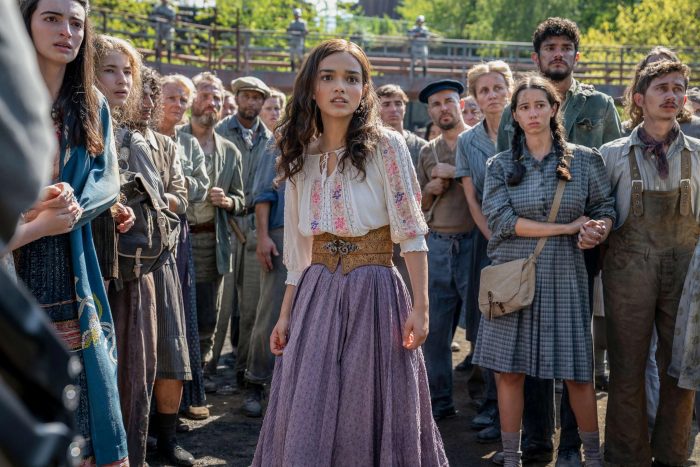Movie Review: The Hunger Games series continues with The Ballad of Songbirds and Snakes prequel
Reviewed by Jeffrey Sanzel
Suzanne Collins’ The Hunger Games (2008) and its sequels, Catching Fire (2009) and Mockingjay (2010), sold over one hundred million copies. The four films (2012 – 2015) made nearly three billion dollars worldwide. They featured John Hutcherson, Liam Hemsworth, Woody Harrelson, Elizabeth Banks, Stanley Tucci, and Donald Sutherland, with the role of Katniss Everdeen elevating Jennifer Lawrence to superstar. Like J.K. Rowlings’ Harry Potter, Collins’ Hunger Games transcended into a cultural phenomenon.
The Hunger Games takes place in the ruins of Panem, a North American country composed of the central Capitol and thirteen surrounding districts. Each year, the remaining twelve districts (the thirteenth destroyed in the war) hold a lottery called “The Reaping” and send tributes to the Capitol to compete in the Hunger Games, a televised death match. The trilogy begins with the seventy-fourth Hunger Games.
In 2020, Collins published a prequel, The Ballad of Songbirds and Snakes, focusing on eighteen-year-old Coriolanus Snow, the young man who would become president. The story opens on the cusp of the tenth annual Hunger Games, a time when the districts’ rebellion is still fresh.
The inherent problem with prequels is ending up where the story starts. At best, you gain insight into the characters’ development, but, for the most part, they either reinforce previous knowledge or, at worst, contradict established canon. The Many Saints of Newark proved to be a tacit outing, giving a little to enrich The Sopranos universe. Conversely, the entertaining Cruella seemed in opposition to much known about the titular character.
Michael Lesslie and Michael Arndt’s screenplay for The Hunger Games: The Ballad of Songbirds and Snakes hews faithfully to the novel, offering an interesting portrait of Snow at age eighteen. Born into a prestigious Capitol family, the orphaned Snow lives in borderline poverty with his grandmother and cousin in a lavish home that has seen better days.
Ballad’s action kicks in with the Academy’s graduating class conscripted to mentor the two dozen tributes. To win a coveted scholarship, Snow must somehow guide his charge to win. Out of spite, the Dean of the Academy, Casca Highbottom, assigns Snow a longshot: the female tribute from District Twelve, Lucy Gray Baird. Lucy Gray, a nomadic musician, is a Covey (read “Sinti” or “Roma”). Her skills as a singer become the game-changer, revealing an unusual—and more importantly—engaging persona to the Panem television audience.
The Hunger Games of Ballad are more akin to gladiators in Rome. The high-tech world of the trilogy comes later in the history. The tributes arrive in cattle cars and are imprisoned in an abandoned zoo without food. The savagery in the tenth games results from brute strength, alliances, and raw cunning. Hints and flashes of the technology that will dominate the later Games are teased, as is the burgeoning, quirky reality television, here shown with a retro 1950s vibe.
The first hour and a half focuses on the buildup and execution of the Hunger Games. The remaining hour centers on a new track, focusing on district intrigue, political unrest, plotting, and betrayal. A distinctly Third Reich aura infuses the military components, emphasizing the fascist nature of the government.
As a film, it is neither more nor less than. Visually strong, its messages of corruption and guilt play on the surface. Director Francis Lawrence, who directed the final three Hunger Games, briskly paces the story. While absent of much innovation, the straightforward, brutal nature reflects Collins’ vision.
Tom Blyth creates a passionate and conflicted Snow. His understated performance pays off in his final transition, which he achieves flawlessly, wholly casting the shadow of who Snow will become. With an Appalachian twang, Rachel Zegler is an ideal Lucy Gray. She shows strength and an underlying danger and is one of the few in the film who achieves a third dimension. (She even makes the almost corny musical pieces work.)
Josh Andrés Rivera is sympathetic if a bit overwrought as Snow’s classmate, the guilt-plagued Sejanus Plinth. Peter Dinklage mines the darkness of Highbottom (he is an actor incapable of giving anything less than a great performance). Jason Schwartzmann is hilariously callous as the weatherman-amateur magician Lucretius “Lucky” Flickerman, the first Hunger Games host.
But the film’s prize performance is Viola Davis’s deliciously over-the-top Dr. Volumnia Gaul, mastermind of the Hunger Games. Her unblinking, monomaniacal evil scientist is a riveting portrait of unbridled sadistic and political cruelty. Only an actor of her caliber could fashion a monster of such unrestrained villainy, endowing every moment with perfect plausibility.
The film makes bold statements about actions and repercussions and the misuse of power, presented with little subtlety. But the depiction of the depravity of reality television resonates. Additionally, the concept of incentivized patriotism is a disturbing but accurate target. Here, Ballad succeeds on a higher plain. Ultimately, the message comes through: Pain can be turned into spectacle and revenge into profit.
Rated PG-13, the film is now playing in local theaters.







